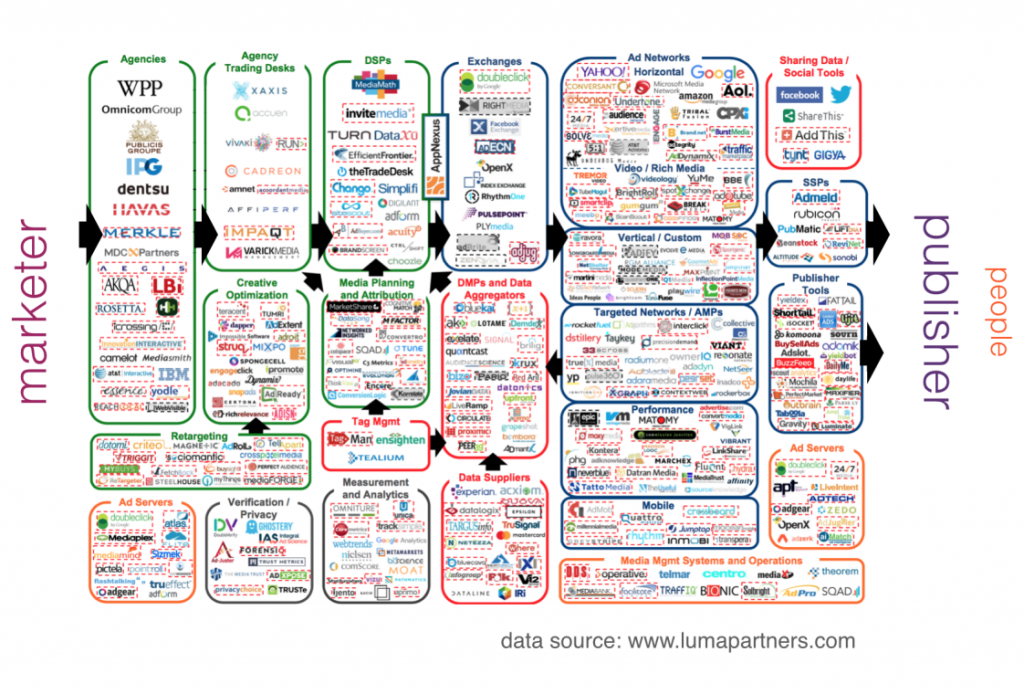Blockchain technology has received much attention from researchers and practitioners, also due to its disruptive potential for businesses and organizations in the public and private industry. Blockchain applications in marketing belong to the many areas that have great potential for finally being adopted by the market, thanks to advancements in the third generation of blockchain technology, Blockchain 3.0. This article is presenting the current state of blockchain in marketing and describing potential applications and mechanisms in this field.
Generations of blockchain
The first generation of blockchain found its application in cryptocurrencies, enabling the decentralized transfer of value between untrusted parties. The immutable transaction history combined with high security for all transactions has opened new possibilities in the field of digital value transfer.
Blockchain 2.0 combines cryptocurrencies with the use of smart contracts and enables the creation of automated financial applications. Decentralised Finance (DeFi) aims at creating a more open, free, and fair financial market that can be accessed with merely an internet connection. The lending and borrowing of various digital assets constitute the largest fraction of the DeFi market and are among the most popular services. In January 2020, the DeFi market represented a size of $1 billion in Total Locked Value (TLV). At its peak in November 2021, the market size has reached a TLV of $239 billion.
Applications that are built upon blockchain technology and address some of the technologies’ limitations, like scalability, sustainability and interoperability, are labeled Blockchain 3.0.
Blockchain encompasses far more than just cryptocurrencies and financial markets. According to current research, business models and operations of more than 65 different industries will be affected by the blockchain technology in the future. Consequently, an increasing amount of research is being conducted about the value creation through blockchains in areas such as supply chain management, healthcare, tourism, energy, agriculture and food. Nevertheless, the literature about possible applications of blockchain in marketing is still scarce at this point. However, scholars and practitioners frequently highlight the relevance for the technology and describe the potential of possible applications in marketing.
Current applications of marketing in the blockchain space
Disintermediation
Electronic intermediaries such as Google or Meta use personal information to create a lock-in effect on their platforms, resulting in various disadvantages for consumers, as well as brands. The blockchain technology offers a solution that is based on bypassing the intermediary level. Without an electronic intermediary, brands could communicate with consumers directly and be able to motivate them to share or disclose information through financial incentives. Brands could have virtual agreements with customers through smart contracts, containing micropayments in favor of the customer when certain activities are executed. In this example, blockchain-enabled technology lets brands recollect some of the lost receipts using a different approach, based on which marketers compensate users directly for their attention, operating without the intermediary level. Consequently, the dependency on third parties (Google, Meta) could be decreased and the recollected revenue could be used to further enhance customer experience.
Trust and transparency
In the agricultural industry, brands can use the blockchain technology to provide trust and transparency to consumers. Due to blockchain’s feature of transparently monitoring the supply chain from end to end, consumers’ trust in brands is increased as they are given the opportunity to verify the authenticity of brand promises, such as food being certified as organic or halal, themselves. Moreover, marketers can use the benefits that come with the usage of the technology to highlight their altruistic actions while keeping their promise to their customers regarding the trustworthy production of their healthy food.
Reputation systems
Reputation systems have a significant impact on the creation of trust and leverage consumers’ feelings in retail marketing. However, demanding the disclosure of personal information during the process of submitting a review, during which data can be tracked and analyzed to profile customers, may create a trust issue. An anonymous reputation system atop a proof of stake blockchain solves the issue of trust, while ensuring an anonymous but transparent and decentralized system. An anonymous rating token, provided automatically after a consumer has made a purchase, keeps individual reviews private and guarantees a strong customer anonymity, while guaranteeing that the development of the seller’s reputation remains transparent to the public. Consequently, the blockchain-based system can be used to leverage trust and boost confidence between consumers and brands.
Loyalty programs
Blockchain-based loyalty programs have proven to be faster than traditional ones, considering the time needed to process customer purchases and convert them into points, as the execution of transactions happens in almost real time. Furthermore, a blockchain based approach creates an open reward system, giving consumers the opportunity to participate in multiple brand programs. This would avoid a lock-in effect and bring switching costs close to zero. In addition, consumers could be able to trade and gift points among peers, thereby creating a social incentive to participate in the system. Certainly, improving customer experience and driving engagement within the program. Moreover, an open reward system offers additional value to smaller businesses, as participating in a wider network increases brand recognition. Nonetheless, the technology has not found wide adoption yet, since implementation costs are high and brands are concerned about the loss of control over their data, due to the decentralized database of the technology.
Fraud in online advertising
In the online advertising system, consumers have been plagued by phishing mails, which are often embedded with fraudulent links to deceive the recipient and steal personal data such as credit card information. With the use of blockchain technology and smart contracts, micropayments could present a possible solution to that. In this context the sender of an e-mail has to pay the recipient a small financial amount. The amount of spam emails could be decreased significantly due to the increased cost that come with sending. This would protect consumers from fraudulent activities.

Can blockchain technology advance marketing?
The main changes of the implementation of the blockchain technology in marketing lie in the elimination of the intermediary level, the leverage of trust between brands and consumers, and the growing transparency. This enables brands to reinvent their relationships with business partners and consumers as well as to increase confidence on all sides.
Nevertheless, there are certain downsides of the technology, which hinder its wide adoption. One aspect concerns the scalability issue of the technology, as in an online advertising ecosystem trillions of transactions per day would be needed. However, the lightning network, as well as the Polygon protocol could offer promising solutions to make the adoption to large scale use cases possible. As of now, implementations of these technologies in the field of marketing could not be identified but further implementation is likely to happen in the future to push adoption of the technology in marketing. Furthermore, the immutability feature of blockchain could hinder its adoption in European countries as the GDPR allow consumers the right to delete their data. It is still unclear how regulators will handle this feature of the blockchain without infringing on consumer rights. Additionally, it is unclear what legal risks smart contracts pose, whether courts will legally recognize the code within smart contracts, and whether the contract parties will be able to intervene retrospectively. Without legal frameworks for these technologies, implementation seems very difficult. Besides these technical concerns, consumers need to understand the technology and its functioning in the field of marketing. Without significant awareness for the technology, consumers are more likely to shy away from it and not make an effort to adapt. Moreover, brands need to investigate which blockchain architecture fits their specific use case best. Sticking with traditional governance and using the immutable features of the technology would lead to the adoption of private blockchains. However, consortium blockchains let brands benefit from the distributed network, thereby increasing trust for consumers, while still having the option to restrict the read and write access to specific users. Public blockchains hold the potential of full transparency which can be used to leverage brand trust among costumers. In general brands need to develop an understanding in order to choose the right type of architecture for their use case.
It is expected that marketing will be fundamentally influenced by blockchain technology, as well as other business areas. Blockchain technology brings extraordinary potential to strengthen trust in societies, return control over data to consumers, and ensure interoperability in a wide range of areas. Especially in marketing, the technology allows brands to leverage trust and to reinvent their relationship with the customer.
